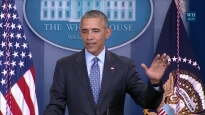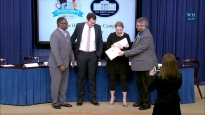President Obama and Prime Minister Gillard of Australia
March 07, 2011 | 9:38 | Public Domain
President Obama and Prime Minister Julia Gillard of Australia speak to the press after their meetings. The President also addresses those involved in the violence in Libya and discusses the international response.
Remarks by President Obama and Prime Minister Gillard of Australia After Bilateral Meeting
Oval Office
11:10 A.M. EST
PRESIDENT OBAMA: Well, I just want to provide a hearty welcome to Prime Minister Gillard, who I had a chance to meet during the ASEAN summit and the G20 summit, and was immediately charmed, as I'm sure at least a good chunk of the Australian people are.
We have no stronger ally than Australia. And as we celebrate the 60th anniversary of our alliance I think it’s especially appropriate to have Prime Minister Gillard here.
I understand that you’ll be speaking to a joint session of Congress, which is a high honor that is reserved for only our closest friends, and I think it’s a measure of the degree to which Australians are held in such high esteem by Americans -- partly because we share so much. Not only do we share a language, a commitment to democracy, a set of shared values, but I think there’s also a shared sense of open spaces and a pioneer spirit. And as Prime Minister Gillard said the first time we met, it’s what makes us “great mates.”
We've had a very useful discussion about a wide range of issues. We began by me once again expressing on behalf of all the people of the United States our deepest condolences for those families that were affected by the terrible floods recently. We want to commend Prime Minister Gillard and her government and all the personnel who were involved for their timely response at what is I know a very difficult time. And once again we want to pledge any support that we can provide to the Australian people in this moment of hardship.
We also talked about a wide range of international issues. I'll be traveling this year to Asia once again for the East Asia summit, and we’ll be hosting in Honolulu the APEC summit. Australia and the United States have a shared interest in expanding trade in the Pacific region, in promoting clean energy, in making sure that we don't have regulatory barriers that prevent our businesses from working across our borders. And so we're very excited about the prospect of joining forces with Australia and other countries to promote growth and employees in the region.
We had a good discussion about security. And I want to once again thank the Australian people and the military families who are making such extraordinary sacrifices in Afghanistan. It is not easy. Australia is our largest non-NATO coalition member making an extraordinary contribution day in and day out. And I want to personally thank Prime Minister Gillard for her strong endorsement of our efforts there. And we discussed the fact that 2011 is going to be a year of transition in which we, more and more, provide the assistance necessary for Afghans to take the lead in that effort.
And we had a discussion about the situation in the Middle East. And I think Prime Minister Gillard and I both share a very firm conviction that the violence that's been taking place and perpetrated by the government in Libya is unacceptable. Australia joined with us in imposing swift and firm sanctions, comprehensive sanctions, against the Libyan government. We continue to monitor the violence there.
I want to send a very clear message to those who are around Colonel Qaddafi: It is their choice to make how they operate moving forward, and they will be held accountable for whatever violence continues to take place there.
In the meantime, we've got NATO, as we speak, consulting in Brussels around a wide range of potential options, including potential military options, in response to the violence that continues to take place inside of Libya. In addition, we have taken the lead on a host of humanitarian efforts, and I just authorized an additional $15 million that will be provided to aid organizations that are already on the ground. And we've been coordinating with the United Nations, which now has a number of personnel on the ground as well, to make sure that people are getting the help they need and we are in a position to respond to any additional emergencies that may arise out of the situation there.
But the bottom line is I think Australia and the United States stand shoulder to shoulder in sending a clear message that we stand for democracy, we stand for an observance of human rights, and that we send a very clear message to the Libyan people that we will stand with them in the face of unwarranted violence and the continuing suppression of democratic ideals that we've seen there.
So, because of these shared values, because of the deep and longstanding relationship between our two countries, it is an extraordinary pleasure to have Prime Minister Gillard here. And I have to say that from a distance at least, she is doing an outstanding job; is a very quick study. And we look forward to -- since she’s a former minister of education -- visiting a school here in Washington, D.C., where we expect the smart students over there to ask all kinds of difficult questions. But I know that Prime Minister Gillard will have good answer for them.
So thank you very much. Welcome.
PRIME MINISTER GILLARD: Can I say thank you to President Obama. I am moderately terrified about how complicated these questions from students could be, but I’m looking forward to visiting a school with you.
I did want to start by saying thank you very much for the warmth of your welcome here. And I am very delighted to be addressing Congress. I know this is an honor for Australia and something that we’re very, very pleased and grateful for. So thank you very much for that.
We’ve been talking today about the friendship between our two countries, about being great mates, talking about the 60th anniversary of our alliance. And as I’ve said to President Obama, I view it as 60 years young. There is so much more to do together in the future, including cooperating as America looks at its force posture, including cooperating in our region at the East Asia summit and beyond.
I’ve talked to President Obama today about preparations for the G20, about its continuing importance in keeping a focus on growth and on jobs for the future. And we’ve talked about the importance of trade, both the Trans-Pacific Partnership, where under President Obama’s leadership we are hoping at APEC to see major progress, and also the Doha Round, where we are hoping to see major progress this year.
We’ve had the opportunity to talk about the fight in Afghanistan. It is hard, but it’s something that I am very personally committed to, to seeing the mission done and to ensuring we play our part in training the Afghan national army and bringing security to Afghanistan so that the Afghan people can lead their own security. So we’ve had the opportunity to talk about transition today as well as events in the Middle East, as the President has outlined.
So it’s been a very great pleasure to be here. Thank you very much for these discussions, and I know we’ll cross the full range of economic discussions, of military discussions, defense cooperation, the mission in Afghanistan, public policy issues which our nation share -- education, which we’ll have the opportunity to talk about at the school; climate change. We will be continuing to work together very strongly for the future.
Thank you.
PRESIDENT OBAMA: Thank you very much, everybody.
Q Will the U.S. tap the SPR?
PRESIDENT OBAMA: Thank you very much.
Q Will the U.S. tap the SPR to deal with oil prices being so high? Will you tap the SPR? Come on.
Q Will you come to Australia, Mr. President?
PRESIDENT OBAMA: I would love to get there. I’m looking forward to a return visit to Australia. The first time I was there, I was telling the Prime Minister, I was eight years old, and had a wonderful time in Sydney. Everybody treated me wonderfully, and I hope I get a chance to get back there soon.
All right. Thank you, everybody.
END
11:24 A.M. EST
|
January 18, 2017
|
January 17, 2017
|
January 16, 2017
|
January 16, 2017
|
|
January 14, 2017
|
January 13, 2017
|
January 13, 2017
|
January 12, 2017
|







